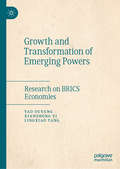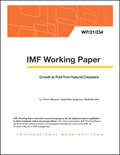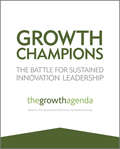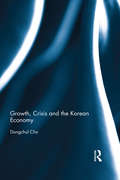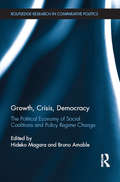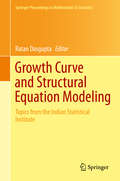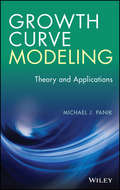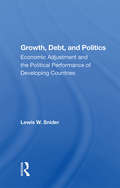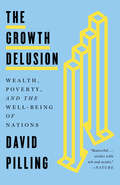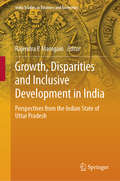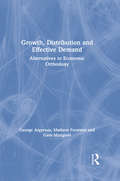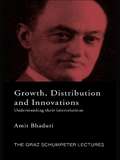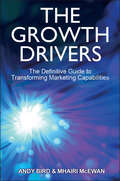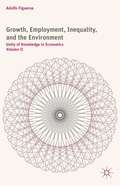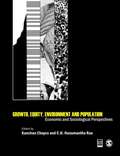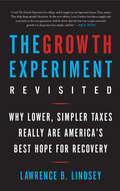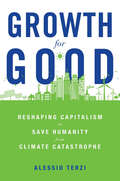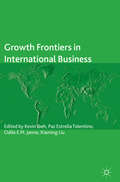- Table View
- List View
The Growth and Role of UK Financial Institutions, 1880-1966
by D.K. SheppardFirst published in 1971, this monetary theory text looks at the United Kingdom's financial institutions and financial statistics as published by the Bank of England or by Government agencies from 1880-1962.
Growth and Structural Reforms: A New Assessment*
by Lone Christiansen Martin Schindler Thierry TresselA report from the International Monetary Fund.
Growth and Transformation of Emerging Powers: Research on BRICS Economies
by Yao Ouyang Xianzhong Yi Lingxiao TangThis book offers a quantitative and qualitative look at the much-discussed BRICS—Brazil, Russia, India, China and South Africa—and explores how their economic ascent might cause global economic realignments in the 21st century. Providing a Chinese perspective on how the global realignment might impact strategic choices and a data-driven approach to the similarities and differences within the so-called BRICS group, this book will be of great interest to economists, international banking professionals, and political forecasters.
Growth at Risk from Natural Disasters (Imf Working Papers)
by Tamim Bayoumi, Saad Noor Quayyum, Sibabrata DasA report from the International Monetary Fund.
Growth Capital for Scaling Social Enterprises
by Benjamin N. Roth Brian Trelstad Ramana Nanda Tarun KhannaIndustry and Background Note
Growth Champions
by The Growth Agenda Caroline Dewing Dave Mccormick Tim JonesUnique insights and fresh perspectives on business growth and innovation Growth is a priority for most businesses, but one that's elusive and difficult to achieve. But some companies do it well, delivering sustainable growth year after year. What makes those companies so special? And what can you and your business learn from them? Growth Champions looks at 20 leading global organizations and identifies the key elements that drive their success. These growth champions include such companies as PepsiCo, Apple, Rolls Royce, Google, Audi, and P&G. While many share some common traits, they all take different paths to growth using different formulas to achieve it. Here, you'll learn how they formulate and execute strategies, motivate and engage people, build a growth culture, and develop and use distinctive competencies to stay ahead of the pack.
Growth Crisis: Dangerous Moves Beyond the Core
by Chris ZookFinding or maintaining a source of sustained and profitable growth has become the number one concern of most CEOs, and pushing the boundaries of the core business into "adjacencies" is the strategy of choice for most companies. Outlining the book's promise to provide a practical framework, using company examples, interviews with CEOs, and statistical analysis for decreasing the substantial risks associated with adjacency expansion and improving the odds for success, this chapter asks the question, what are successful adjacency moves and why are they important?
Growth, Crisis and the Korean Economy
by Dongchul ChoSince the 2008 global financial crisis, policymakers as well as academicians have been seeking to fathom why subsequent recoveries remain tenuous. Other outstanding issues that they have been trying to understand include: why do some economies grow faster than others? How should the exchange rate volatility be understood and what factors make an economy more likely to fall into an exchange rate crisis? What policies need to be taken during tranquil periods, and how should they be changed once the crisis is triggered? As a partial effort to meet such interests, this book provides insights into these issues. This book examines growth and convergence (Part I), exchange rate volatility and the Asian crisis (Part II), and the global crisis (Part III). In addition, the book also draws lessons from South Korea's experiences - a country which has undergone three different crises and brisk recoveries (Part IV). The book also includes some practical and policy-oriented analysis. This is a truly comprehensive book bringing together varied topics and diversity under one common theme - economic growth and crisis.
Growth, Crisis, Democracy: The Political Economy of Social Coalitions and Policy Regime Change (Routledge Research in Comparative Politics)
by Hideko Magara and Bruno AmableSince the global financial crisis of 2008, advanced economies have been making various efforts to overcome the economic impasse. While the contrast between the countries that have escaped from the crisis relatively quickly and those still suffering from serious problems is becoming clearer, a new economic crisis stemming from newly emerging economies has again impacted advanced economies. In retrospect, both leftist and rightist governments in advanced economies pursued expansive macroeconomic and welfare policies from the post-WWII period to the oil shocks of the 1970s. While we recognise that the particular policy regime in this ‘Golden Decades’ during which the left and the right implemented similar policies cross-nationally, were characterised by outstanding economic growth in each country, the specific growth patterns varied across countries. Different social coalitions underpinned different growth models. This book is premised on tentative conclusions that Magara and her research collaborators have reached as a result of three years of study related to our previous project on economic crises and policy regimes. Recognising the need to analyse fluid and unstable situations, we have set up a new research design in which we emphasise political variables—whether political leaders and citizens can overcome the various weaknesses inherent in democracy and escape from an economic crisis by establishing an effective social coalition. A new policy regime can be stable only if it is supported by a sufficiently large coalition of social groups whose most important policy demands are satisfied within the new policy regime.
Growth Curve and Structural Equation Modeling
by Ratan DasguptaThis book describes some recent trends in GCM research on different subject areas, both theoretical and applied. This includes tools and possibilities for further work through new techniques and modification of existing ones. A growth curve is an empirical model of the evolution of a quantity over time. Growth curves in longitudinal studies are used in disciplines including biology, statistics, population studies, economics, biological sciences, sociology, nano-biotechnology, and fluid mechanics. The volume includes original studies, theoretical findings and case studies from a wide range of applied work. This volume builds on presentations from a GCM workshop held at the Indian Statistical Institute, Giridih, January 18-19, 2014. This book follows the volume Advances in Growth Curve Models, published by Springer in 2013. The results have meaningful application in health care, prediction of crop yield, child nutrition, poverty measurements, estimation of growth rate, and other research areas.
Growth Curve Modeling
by Michael J. PanikFeatures recent trends and advances in the theory and techniques used to accurately measure and model growthGrowth Curve Modeling: Theory and Applications features an accessible introduction to growth curve modeling and addresses how to monitor the change in variables over time since there is no "one size fits all" approach to growth measurement. A review of the requisite mathematics for growth modeling and the statistical techniques needed for estimating growth models are provided, and an overview of popular growth curves, such as linear, logarithmic, reciprocal, logistic, Gompertz, Weibull, negative exponential, and log-logistic, among others, is included.In addition, the book discusses key application areas including economic, plant, population, forest, and firm growth and is suitable as a resource for assessing recent growth modeling trends in the medical field. SAS® is utilized throughout to analyze and model growth curves, aiding readers in estimating specialized growth rates and curves. Including derivations of virtually all of the major growth curves and models, Growth Curve Modeling: Theory and Applications also features:* Statistical distribution analysis as it pertains to growth modeling* Trend estimations* Dynamic site equations obtained from growth models* Nonlinear regression* Yield-density curves* Nonlinear mixed effects models for repeated measurements dataGrowth Curve Modeling: Theory and Applications is an excellent resource for statisticians, public health analysts, biologists, botanists, economists, and demographers who require a modern review of statistical methods for modeling growth curves and analyzing longitudinal data. The book is also useful for upper-undergraduate and graduate courses on growth modeling.
Growth, Debt, And Politics: Economic Adjustment And The Political Performance Of Developing Countries
by Lewis W. SniderThis book addresses the question of how political capacity of the government of a developing country affects its ability to implement structural adjustments in its economy in response to external pressures. It builds on the inductive foundation of comparative case studies and speculative insights.
The Growth Delusion: Why Economists Are Getting It Wrong And What We Can Do About It
by David PillingA provocative critique of the pieties and fallacies of our obsession with economic growth We live in a society in which a priesthood of economists, wielding impenetrable mathematical formulas, set the framework for public debate. Ultimately, it is the perceived health of the economy which determines how much we can spend on our schools, highways, and defense; economists decide how much unemployment is acceptable and whether it is right to print money or bail out profligate banks. The backlash we are currently witnessing suggests that people are turning against the experts and their faulty understanding of our lives. Despite decades of steady economic growth, many citizens feel more pessimistic than ever, and are voting for candidates who voice undisguised contempt for the technocratic elite. For too long, economics has relied on a language which fails to resonate with people's actual experience, and we are now living with the consequences. In this powerful, incisive book, David Pilling reveals the hidden biases of economic orthodoxy and explores the alternatives to GDP, from measures of wealth, equality, and sustainability to measures of subjective wellbeing. Authoritative, provocative, and eye-opening, The Growth Delusion offers witty and unexpected insights into how our society can respond to the needs of real people instead of pursuing growth at any cost.
Growth, Disparities and Inclusive Development in India: Perspectives from the Indian State of Uttar Pradesh (India Studies in Business and Economics)
by Rajendra P. MamgainThe book critically examines the high growth trajectory in India, particularly since the late 1980s, a period which is characterized by increasing inequality. Through various studies from the Indian state of Uttar Pradesh -- a state more populous than Brazil and with a GDP comparable to Bangladesh -- it sheds light on the link between growth and inequality in emerging economies. The slow pace of any upward movement in terms of various development indicators in low-income Indian states is due to a number of factors, including their historical disadvantages. Over a period of time, this has resulted in widening disparities, both between different regions of these states, and between these states and other more prosperous Indian states.The book provides a holistic, yet critical, region-wise analysis of the achievements of Uttar Pradesh compared to other states and to India as a whole, in the context of indicators of inclusive development, namely, growth, employment, poverty, infrastructure, agriculture, industry, education and health. Based on the latest data and sophisticated analysis methods, it assesses inequality and development disparities, clearly identifying three major challenges that poorer states face in redressing poverty and expanding inclusive growth – increasing economic opportunities, empowering poor and marginalised groups to avail new opportunities in a rapidly changing world, and ensuring an effective safety net to reduce vulnerability.The book suggests strategies for promoting high and sustained economic growth, and highlights the significance of broadening social inclusiveness through greater and more rapid access to economic and social opportunities, and building strong social safety nets to protect the chronically poor and mitigate their risks and vulnerabilities with the help of good governance and institutions. With contributions from leading scholars from the region, it is a valuable resource for researchers working in the area of growth and inequality, as well as for policy makers from developing economies around the globe.
Growth, Distribution and Effective Demand: Alternatives to Economic Orthodoxy
by George Argyrous Gary MongioviGrowth, Distribution, and Effective Demand presents original essays on a variety of topics in theoretical and applied economics. The book honors the work of Edward J. Nell and develops interconnected themes that run through the modern Post-Keynesian tradition. The first part deals with the fundamental idea that economic growth is demand-driven, with special attention to policy ramifications. The second theme concerns the connection between economic growth and the structural characteristics of a market economy. These issues are closely linked to a critical tradition that calls into question key elements in orthodox economics. The final part of the book aims to buttress non-orthodox approaches to growth and distribution by critiquing particular aspects of the conventional theory, by elaborating neglected themes in non-orthodox theory, or by exploring some overlooked methodological ideas.
Growth, Distribution and Innovations: Understanding their Interrelations (The\graz Schumpeter Lectures)
by Amit BhaduriIdea for those studying advanced macroeconomic and written by a widely published author, this book outlines a new and more fruitful way of understanding, analyzing and formally modelling economic growth.In his series of lectures, collected here in one concise and engaging book, Amit Bhaduri draws on contemporary issues such as the role of competiti
The Growth Drivers
by Mhairi Mcewan Andy BirdThe Growth Drivers is a practical guide to building marketing capabilities. It explains why it is critical that organizations invest in the capabilities needed to excel at customer-centric marketing to drive growth. The authors explain what world-class marketing means in practice and reveal the power of strategic marketing as a dynamic propeller of growth. Each chapter includes a summary, a separate in-depth case study, a range of illustrative real-life examples and some practical tools based on the work of leading practitioners in this pioneering field, as well as relevant diagrams and pictures.
Growth Dynamics in New Markets: Improving Decision Making through Model-Based Management
by Martin F. Schaffernicht Stefan N. GroesserAn innovative simulation-based approach for strategic decision making when launching new products Growth Dynamics in New Markets contains a dynamic case study and simulations that reveal what it takes to successfully introduce a product into a new market. Written by experts in the field, the text and companion website include a compelling simulation game and a variety of simulation models. Using the simulation game and computer models, readers are challenged to design and put in place a strategy about product introduction and competitive behavior. The simulation models build on each other to help to arrive at a comprehensive understanding of product uptake as well as market development and competitive dynamics. The authors present different approaches for enhancing the models and offer guidance for applying them to real-world problems. This groundbreaking text clearly shows how to develop maps of dynamic systems, formulate candidate policies and evaluate them based on the simulations. It also reveals how to use computer simulations to understand what decisions could and should be made, when to make them and how intensive they should be. The authors present an interactive approach that: Contains an innovative combination of a case study, simulation game and simulation models for developing the skills to introduce a product to the marketplace Offers targeted questions that help to enhance the understanding of the material presented Presents detailed answers and solutions to a number or real-world business challenges Features video tutorials that explain how the simulation experiments are implemented and interpreted Aids in the development an action-oriented, pragmatic understanding of the underlying forces in business Designed for students of business administration, management, industrial engineering, informatics, engineering, and public policy, Growth Dynamics in New Markets offers an innovative approach that combines the practice of dynamic reasoning and the use of simulation to design and test possible policies.
Growth, Employment, Inequality, And The Environment
by Adolfo FigueroaGrowth, Employment, Inequality, and the Environment deals with the fundamental economic problems of our time: employment, inequality, the environment, and quality of life. This exciting new volume is unique in that it is the first book of its kind in which these problems are analyzed using a unified theory framework. Figueroa achieves his goal by addressing two significant problems. First, to solve the epistemological challenges of building unity of knowledge, he presents a unified theory of capitalism. Second, he considers the epistemological problem of the role of theory in scientific knowledge. This book therefore deals with a consistent theoretical system. That having been said, these theories which contain logically correct propositions may turn out to be empirically false. In order to avoid this error, some rules of scientific knowledge are needed. Growth, Employment, Inequality, and the Environment presents a method that contains such rules. The method is derived from the Popperian epistemology, making it operational in economics. The proposed unified theory is therefore empirically valid; it is a good approximation of the real world. Theoretical economics is thus treated under explicit epistemological rules: theory is the servant, not the master.
Growth, Employment, Inequality, and the Environment
by Adolfo FigueroaGrowth, Employment, Inequality, and the Environment deals with the fundamental economic problems of our time: employment, inequality, the environment, and quality of life. This exciting new volume is unique in that it is the first book of its kind in which these problems are analyzed using a unified theory framework. Figueroa achieves his goal by addressing two significant problems. First, to solve the epistemological challenges of building unity of knowledge, he presents a unified theory of capitalism. Second, he considers the epistemological problem of the role of theory in scientific knowledge. This book therefore deals with a consistent theoretical system. That having been said, these theories which contain logically correct propositions may turn out to be empirically false. In order to avoid this error, some rules of scientific knowledge are needed. Growth, Employment, Inequality, and the Environment presents a method that contains such rules. The method is derived from the Popperian epistemology, making it operational in economics. The proposed unified theory is therefore empirically valid; it is a good approximation of the real world. Theoretical economics is thus treated under explicit epistemological rules: theory is the servant, not the master.
Growth, Equity, Environment and Population: Economic and Sociological Perspectives
by Kanchan Chopra C.H. Hanumantha RaoThe book brings together papers on a range of issues that are of relevance to the Indian economy and polity in the new millennium. The contributors examine issues relating to growth and macro-economic fundamentals, the state of and future prospects for industry and agriculture in an era of high growth and globalization. Growing regional disparities, gender issues and other forms of inequity dominate the analysis of health care, migration, fertility and mortality related issues. Contributors also analyse contentious issues at the interface of environment and development, such as environmental efficiency of industry, links between alternative notions of value and household use of biomass. In a complementary manner, sociological perspectives on religion, family, gender and state introduce into the volume a qualitative analysis of the social institutions within the framework of which economic growth and structural change take place.
Growth Experience in Transition Countries, 1990-98
by International Monetary FundA report from the International Monetary Fund.
The Growth Experiment Revisited: Why Lower, Simpler Taxes Really Are America's Best Hope for Recovery
by Lawrence B. LindseyThe first edition of The Growth Experiment, originally published in 1990 as a response to critics of the Reagan-era tax cuts, became a kind of bible for proponents of supply-side economics. This new and updated edition, which explores the economic effects of America’s tax policy over the last five presidential administrations, makes a bold and timely argument against the centerpiece of Obama’s economic policy--increasing taxes on the wealthy. Lawrence Lindsey provides a data-rich argument showing that because of changes in human behavior prompted by tax cuts, lowering taxes on the wealthy "costs” the treasury far less than most economists calculate and creates an economic boon to middle and lower income earners. Sure to be controversial, The Growth Experiment Revisited is essential reading for anyone looking to understand the arguments at the heart of this most fractious of American policy debates.
Growth for Good: Reshaping Capitalism to Save Humanity from Climate Catastrophe
by Alessio TerziFrom the front lines of economics and policymaking, a compelling case that economic growth is a force for good and a blueprint for enrolling it in the fight against climate change. Economic growth is wrecking the planet. It’s the engine driving climate change, pollution, and the shrinking of natural spaces. To save the environment, will we have to shrink the economy? Might this even lead to a better society, especially in rich nations, helping us break free from a pointless obsession with material wealth that only benefits the few? Alessio Terzi takes these legitimate questions as a starting point for a riveting journey into the socioeconomic, evolutionary, and cultural origins of our need for growth. It’s an imperative, he argues, that we abandon at our own risk. Terzi ranges across centuries and diverse civilizations to show that focus on economic expansion is deeply interwoven with the human quest for happiness, well-being, and self-determination. Growth, he argues, is underpinned by core principles and dynamics behind the West’s rise to affluence. These include the positivism of the Enlightenment, the acceleration of science and technology and, ultimately, progress itself. Today growth contributes to the stability of liberal democracy, the peaceful conduct of international relations, and the very way our society is organized through capitalism. Abandoning growth would not only prove impractical, but would also sow chaos, exacerbating conflict within and among societies. This does not mean we have to choose between chaos and environmental destruction. Growth for Good presents a credible agenda to enroll capitalism in the fight against climate catastrophe. With the right policies and the help of engaged citizens, pioneering nations can set in motion a global decarbonization wave and in parallel create good jobs and a better, greener, healthier world.
Growth Frontiers in International Business
by Kevin Ibeh Paz Estrella Tolentino Odile E. M. Janne Xiaming LiuThe ACADEMY OF INTERNATIONAL BUSINESS (UK and Ireland Chapter) Published in association with the UK and Ireland Chapter of the Academy of International Business Reflecting the aim of the 43rd AIB-UKI Conference on re-invigorating the still faltering global economy, this new book brings together fresh and interdisciplinary perspectives on avenues for further advancing the growth of international enterprises and the global economy. Growth Frontiers in International Business includes contributions from a diverse number of established and emergent IB scholars, who richly illustrate contemporary international business growth frontiers. The book presents discussion and thought into four main foci; policy frontiers, emerging market frontiers, innovation pathways and ethical growth avenues.


